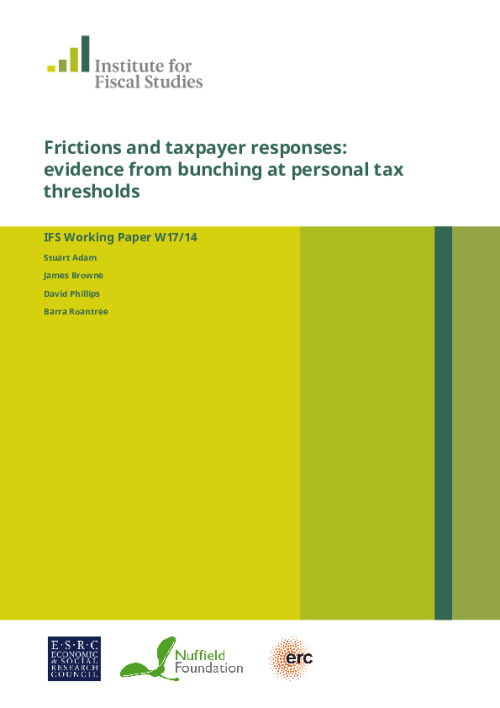Downloads

Download August 2017 version
PDF | 1.19 MB
We exploit kinks and notches in the UK personal tax schedule over a 40-year period to investigate how taxpayers respond to income tax and social security contributions. At kinks, where the marginal rate rises, we find bunching by company owner-managers and the self-employed, but not those with only employment income. Responses to notches, where the average rate rises, provide compelling evidence that this is because most employees face substantial frictions: fewer than a quarter bunch even where doing so would increase both consumption and leisure. We develop a new approach for identifying selection in who responds and for decomposing responses into hours and wage components. We find that those employees who do bunch at notches are almost exclusively part-time workers, but tend to have lower wages and work more hours than those part-time workers who do not bunch.
This page was updated 29/08/2019.
Authors

Senior Economist
Stuart is a Senior Economist working in the Tax sector, and focuses on analysing the design of the tax and benefit system.

James Browne

Associate Director
David is Head of Devolved and Local Government Finance. He also works on tax in developing countries as part of our TaxDev centre.

Research Fellow Trinity College Dublin
Barra is a Research Fellow at IFS and Assistant Professor of Economics at Trinity College Dublin.
Working Paper details
- DOI
- 10.1920/wp.ifs.2017.W1714
- Publisher
- The IFS
Suggested citation
Adam, S et al. (2017). Frictions and taxpayer responses: evidence from bunching at personal tax thresholds. London: The IFS. Available at: https://ifs.org.uk/publications/frictions-and-taxpayer-responses-evidence-bunching-personal-tax-thresholds (accessed: 2 May 2024).
Related documents
Download August 2019 version
PDF | 1.24 MB
More from IFS
Understand this issue

Spring Budget 2024: What you need to know
7 March 2024

The £600 billion problem awaiting the next government
25 April 2024

If you can’t see it, you can’t be it: role models influence female junior doctors’ choice of medical specialty
24 April 2024
Policy analysis

Spring Budget 2024
6 March 2024

Progression of nurses within the NHS
12 April 2024

Regional variation in earnings and the retention of NHS staff in Agenda for Change bands 1 to 4
10 April 2024
Academic research

Intertemporal income shifting and the taxation of business owner-managers
24 January 2024

Insurance, redistribution, and the inequality of lifetime income
2 November 2023

Labour market inequality and the changing life cycle profile of male and female wages
15 April 2024